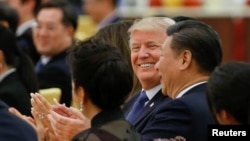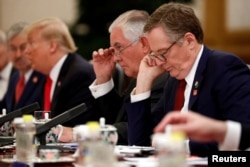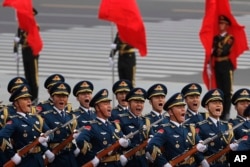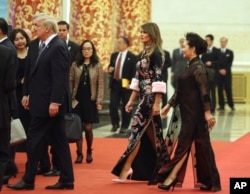President Donald Trump struck a markedly softer tone on touchy subjects like North Korea and trade with President Xi Jinping of China Thursday, and highlighted his "incredibly warm" feeling toward his counterpart.
During joint statements after talks in Beijing, Trump expressed optimism the U.S. and China will resolve the North Korea nuclear crisis. "I do believe there's a solution to that, as you do," Trump said.
Trump said he has "great respect" for Xi's leadership on trade and noted the U.S. must change its policy.
"It's too bad that past administrations allowed it go get so far out of kilter," Trump added. "But we'll make it fair, and it will be tremendous for both of us."
Trump concluded remarks by touting his "great chemistry" with Xi.
The Chinese leader said Beijing's relationship with Washington "now stands at a new starting point" and vowed to "enhance communication and cooperation on the nuclear issues on the Korean Peninsula" and other key topics.
"For China and the United States, cooperation is the only viable choice, and win-win cooperation can take us to a better future," said the Chinese president.
Trump is on a 12-day, five-nation tour of Asia that will take him to Danang, Vietnam, on Friday, where he will speak at a meeting of the Asia Pacific Economic Cooperation (APEC).
North Korea
Much of Trump's Asia tour has focused on North Korea, which is developing a nuclear and missile program in violation of U.N. Security Council resolutions.
Trump pressed Xi privately on the North Korea nuclear issue, according to Trump administration officials. According to Secretary of State Rex Tillerson, Trump told Xi, "You're a strong man, I'm sure you can solve this for me."
Speaking in Beijing, Tillerson noted "there is no disagreement on North Korea" between the United States and China. The diplomat pointed out the Chinese have been clear and unequivocal over two days of talks that they will not accept a North Korea with nuclear weapons.
"There's no space between both of our objectives," said Tillerson. "We have our own views of the tactics, the timing and how far to go with pressure and that's what we spend a lot of time exchanging views on."
Later, Trump and Xi spoke to a meeting of business leaders. Trump said, "I thank President Xi for his recent efforts to restrict trade with North Korea and cut off banking ties. China can fix this problem easily and quickly."
Bilateral trade
The shift in Trump's rhetoric on trade was especially notable because the U.S. leader has long complained about the trade imbalance between China and the United States.
For the first 10 months of the year, China's trade surplus with the U.S. was $223 billion, according to recent data released by China's General Administration of Customs.
Trump said the U.S. trade deficit with China is, "shockingly hundreds of billions of dollars" annually.
Xi said there is a wider and prosperous future for U.S.-China cooperation on trade, adding that $250 billion worth of business deals were signed during Trump's visit to China and that, "Chinese investment in the United States is rising rapidly."
But the roughly 15 agreements unveiled in Beijing are mostly non-binding memorandums of understanding, and according to Bloomberg News, "could take years to materialize — if they do at all."
Derek Scissors, a resident scholar at the American Enterprise Institute, is pessimistic that such deals will do much to address the real hindrances to trade relations with China.
"The president likes deals, and he likes big numbers, but we're not going to change something he doesn't like, like the trade deficit, without changing Chinese trade practices," Scissors said. "China has to have a different approach to trade in the world than it does."
Scissors said that more than the deficit, it is what is behind the numbers, such as the fact that Chinese state-owned enterprises never go out of business.
"Which means American goods and services can't ever win in the China market," he said.
In his joint statement, Xi said, "there needs to be in-depth discussions on the trade imbalance" with the United States, among other issues.
After the trade talks, Secretary Tillerson said the accomplishments were "pretty small," adding the U.S. concerns about the pace of progress was communicated to Chinese officials Thursday.
Human rights
Trump and Xi also had a "frank exchange" on human rights, according to Tillerson, though human rights did not appear to be a major part of Trump's agenda.
The U.S. president made no public mention of China's alleged human rights abuses during his stop in the country, which is ruled by a one-party, authoritarian government that severely restricts dissent.
That is in contrast to many of Trump's predecessors, including Barack Obama, who on his trips to China would often bring up human rights concerns during addresses to students or other members of the Chinese public.
While Trump has not forcefully and publicly raised human rights concerns in authoritarian countries such as China, White House officials have suggested that he is doing so in private — a strategy they say is more effective than public shaming.
"Show me the money," said Sophie Richardson, China director for Human Rights Watch. "All I see is a half-sentence reference in Tillerson's remarks from yesterday that he and Trump discussed human rights. I have no idea what those were, or if anybody actually suggested that one side improve."
But it was unclear how effective such a public condemnation would be coming from Trump, who at various times has referred to Xi as a "terrific guy," a "great leader," and a "very special man," Richardson said.
No questions taken
Many rights activists also were concerned after Trump did not take questions from reporters during an appearance alongside his Chinese counterpart on Thursday.
Such a move reinforces China's "authoritarian impulses," according to Richardson, even while noting that Obama also did not take reporters' questions during his first visit to the country in 2009.
"It is a catastrophically stupid thing to do in China, where the press is already deeply limited, and in fact, Chinese journalists get locked up for honest reporting all the time," she said.
When asked why Trump did not take questions from reporters, White House Press Secretary Sarah Huckabee Sanders said, "It was at the Chinese insistence," according to CNN.
VOA's Bill Ide, William Gallo and Mary Alice Salinas contributed to this report.









